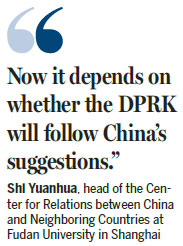China calls for restraint over satellite plans
Foreign Minister says Beijing does not want to see actions that raise tensions
Beijing has told Pyongyang it does not want to see any moves to further raise tensions, Foreign Minister Wang Yi has said.
Wang's remarks, made on Thursday in London, were released on Friday. They came after Pyongyang told UN agencies on Tuesday that it planned to launch a satellite between Feb 8 and 25.
Pyongyang has said it has a sovereign right to pursue a space program, although some countries believe such launches are missile tests and have called for Pyongyang to scrap the plans.
Wang said it was natural that Beijing had sent its special envoy for Korean Peninsula affairs, Wu Dawei, to Pyongyang as China is the host country of the Six-Party Talks.
Wu began his trip on Feb 2, amid a flurry of diplomatic moves after the Democratic People's Republic of Korea claimed it had successfully tested its first H-bomb on Jan 6. Foreign Ministry spokesman Lu Kang said Wu had returned to Beijing on Feb 4.
He said Wu met DPRK Foreign Minister Ri Su-yong and First Vice-Foreign Minister Kim Kye-gwan, and held talks with Vice-Foreign Minister Ri Yong-ho.
Wang told Hong Kong's Phoenix Television that China needed "contacts with the DPRK to listen to their opinion" in such a serious situation.
"Of course, an important point is to express China's clear position to the DPRK. We don't want to see anything happen that could cause further tensions," he said.
"We hope all sides, including the DPRK, can meet each other half way, and work hard together to push the Korean Peninsula nuclear issue onto the track of a negotiated resolution."
Shi Yongming, an Asia-Pacific studies research fellow at the China Institute of International Relations, said the key to tackling the Korean Peninsula issue is "whether Pyongyang and Washington can resolve their problems in a peaceful way".
"China has not only sent the message to the DPRK, but also to the United States. The impasse on the Korean Peninsula at present is no good for either side."
He said that by sending Wu Dawei, China had fulfilled its obligation as a communication channel between Pyongyang and the world.

US Secretary of State John Kerry and Wang met in Beijing last week to discuss the Korean Peninsula issue. The meeting went on for much longer than originally planned.
The two sides agreed on the need for a new UN Security Council resolution against the DPRK. The US wanted stiffer sanctions, but Beijing said that the aim of the sanctions should not be to further raise tensions but to lead the DPRK back to the negotiating table.
"China has done its utmost, and now it depends on whether the DPRK will follow China's suggestions," said Shi Yuanhua, head of the Center for Relations between China and Neighboring Countries at Fudan University in Shanghai.
Shi said he did not foresee Pyongyang canceling the rocket launch plan.
"The launch is a show of strength by Pyongyang to Washington," Shi said, adding the launch would be canceled only if the US changed its tough stance.
Wang also said on Thursday when speaking at the Supporting Syria and the Region conference in London that China would donate 10,000 tons of food to help ease the food shortages among Syrian refugees.
He said he had changed his schedule in Africa to fly to London especially for the meeting.
lixiaokun@chinadaily.com.cn


















